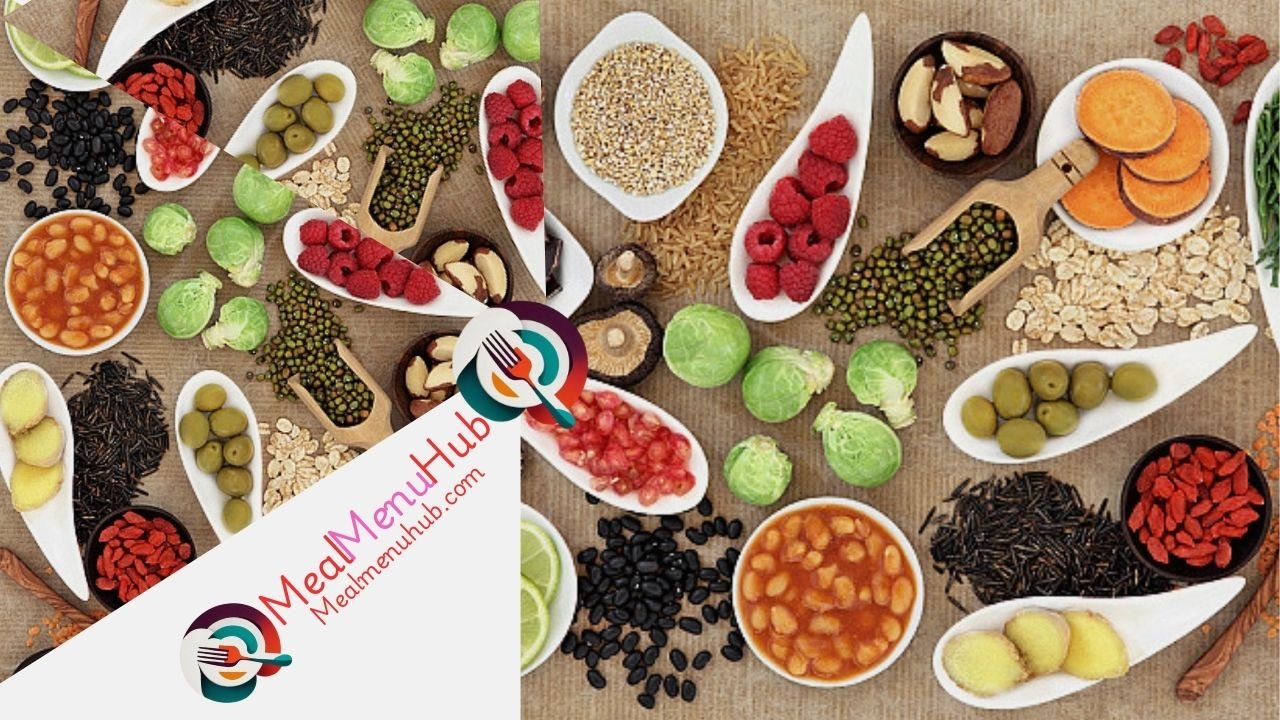The Importance of a Balanced Diet – Meal Menu Hub
The Importance of a Balanced Diet – Meal Menu Hub
Intro
A balanced diet is one of the most effective ways to maintain health and vitality throughout life. It provides your body with the right proportion of nutrients, ensuring that you have enough energy and strength to manage daily activities and long-term health. But why exactly is a balanced diet so essential? Let’s explore.

What Makes Up a Balanced Diet?
A balanced diet includes a mix of carbohydrates, proteins, fats, vitamins, minerals, and water. Each nutrient plays a specific role in keeping your body running smoothly, and an optimal balance among these nutrients helps maintain your overall health.The Importance of a Balanced Diet – Meal Menu Hub
Carbohydrates: The Body’s Main Fuel
Carbohydrates are the primary energy source, fueling everything from basic cellular functions to intense physical activity. Eating complex carbohydrates from whole grains, vegetables, and fruits ensures a steady supply of energy without the blood sugar spikes caused by simple carbs like sugary snacks.The Importance of a Balanced Diet – Meal Menu Hub
Proteins: Building Blocks of the Body
Protein is essential for growth, muscle repair, and immune health. High-quality proteins from lean meats, fish, eggs, and legumes contribute to cell repair, hormone production, and muscle building, making it a key component of a balanced diet.The Importance of a Balanced Diet – Meal Menu Hub
Fats: Essential but Often Misunderstood
While fats are often seen as unhealthy, they are vital for the body. Healthy fats, like those from avocados, nuts, and olive oil, support hormone production, brain health, and cell structure. However, it’s crucial to avoid trans fats and limit saturated fats, as they can negatively impact heart health.
Vitamins and Minerals: Tiny Powerhouses for Health
Vitamins and minerals may only be needed in small amounts, but they are essential for bodily functions. Vitamin C, for example, boosts immunity, while calcium is vital for bone health. Eating a wide variety of fruits, vegetables, dairy products, and lean meats can provide the necessary vitamins and minerals.The Importance of a Balanced Diet – Meal Menu Hub
The Importance of Hydration
Water is often overlooked but is crucial to maintaining body temperature, removing waste, and even lubricating joints. Staying hydrated helps maintain energy and focus throughout the day. Aim for at least 8 cups of water daily, and increase your intake during exercise or hot weather.The Importance of a Balanced Diet – Meal Menu Hub
Benefits of a Balanced Diet
Maintaining a balanced diet has both physical and mental benefits. Physically, it helps manage weight, provides consistent energy, and reduces the risk of chronic diseases like diabetes and heart disease. Mentally, it can improve mood and enhance cognitive functions, making it easier to stay productive and focused.The Importance of a Balanced Diet – Meal Menu Hub
How a Balanced Diet Supports the Immune System
A strong immune system relies on proper nutrition. Nutrients like vitamin C, zinc, and protein are crucial for immune function. When your diet is rich in these nutrients, your body is better equipped to fight off infections and stay resilient against illnesses.The Importance of a Balanced Diet – Meal Menu Hub
Balanced Diet for Different Age Groups
Nutritional needs change across the lifespan. Children require more nutrients for growth, while adults need balanced diets for maintenance and energy. Seniors, on the other hand, often require more calcium and vitamin D to support bone health.The Importance of a Balanced Diet – Meal Menu Hub
Impact of an Imbalanced Diet
An imbalanced diet, whether high in sugar, fat, or processed foods, can lead to various health issues. It increases the risk of obesity, heart disease, and nutrient deficiencies, which can have long-term effects on your quality of life.The Importance of a Balanced Diet – Meal Menu Hub
Balanced Diet and Weight Management
A balanced diet can support healthy weight management. Including fiber-rich foods, lean proteins, and healthy fats helps control appetite, prevent overeating, and maintain a healthy weight over time.
Common Myths about a Balanced Diet
There are several myths about balanced diets, such as “all fats are bad” or “carbs make you gain weight.” In reality, healthy fats and complex carbs are crucial for health. Understanding these myths can help make better dietary choices.The Importance of a Balanced Diet – Meal Menu Hub
Tips for Incorporating a Balanced Diet into Your Life
Making a balanced diet part of your life doesn’t have to be hard. Start by planning your meals, choosing whole foods over processed options, and learning to read nutrition labels to make informed choices. Simple swaps, like choosing whole-grain bread instead of white, can make a big difference.
Conclusion
A balanced diet isn’t just about eating the “right” foods; it’s about providing your body with the nutrients it needs to thrive. By incorporating a variety of nutrients into your diet, you’re giving yourself the best chance at long-term health, energy, and vitality.
FAQs
- How can I tell if my diet is balanced?
A balanced diet typically includes a variety of fruits, vegetables, proteins, grains, and fats in appropriate portions. A nutritionist can provide a detailed assessment if you’re unsure. - What are easy ways to improve my diet?
Start small: add more vegetables, swap refined grains for whole grains, and reduce processed food intake. - Do I need to take supplements to maintain balance?
Supplements can help if you have specific deficiencies, but it’s best to get nutrients from food whenever possible. - Can a balanced diet help with chronic diseases?
Yes, a balanced diet can lower the risk of chronic diseases by supporting overall health and reducing inflammation. - What is a simple meal plan for a balanced diet?
A simple plan includes balanced portions of lean protein, whole grains, colorful vegetables, and healthy fats. A nutritionist can help you design one based on your needs.
